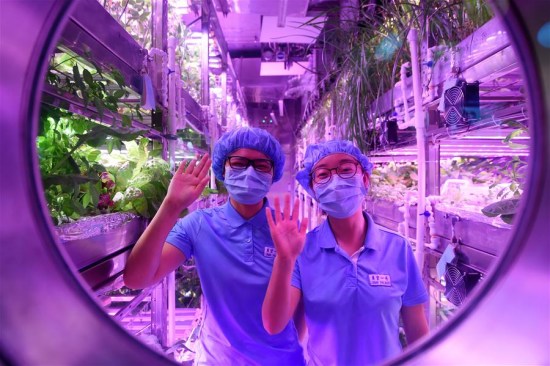Chinese "Moon Palace" set a new record
- Transfer

Two volunteers greet spectators from inside the Lunar Palace-1, a complex of testing regenerative life-support systems with a closed cycle, built to conduct a series of experiments for a promising base program on the Moon at Beykhan University , Beijing, May 10, 2017. Source: Xinhua / Ju Huanzong.
After a whole year inside Yuegong-1 (approx. Translation - Yuegun-1 or Lunar Palace-1) in Beijing, the last four volunteers left the simulator to applause others, carrying vegetables grown by themselves. Successful completion of the project Yuegong-365 is a new world record for the length of stay in a closed environment with self-sufficiency.
The project started on May 10, 2017 and ended on May 15, 2018, five days later than the planned deadline. A small delay was organized deliberately in order to study the actions of the “crew” and its psychological state in the event of a contingency.
Built at Beijing's Beihan University, Yuegong-1 is a complex with a total area of about 150 square meters, of three interconnected compartments, one of which is a household, and two are for growing biomass. In such a small space, however, we managed to grow many different plants, such as strawberries, soybeans and carrots. Eight volunteers, from among university students, were divided into two groups. The first, two young men and two girls, has been in the complex since May 10 for 60 days, then they were replaced by the second such group, which was to be held inside for 200 days. Then, on January 26, 2018, the second group was again replaced by the first one that completed the program after another 110 days.
After exiting the installation, the health of each program participant was studied very carefully. “Alas, we are again in isolation,” one of the girls said in an interview with CCTV . “A number of physiological tests are waiting for us, and then about a week in the hospital under observation, and only after that we will be completely free.”
The experiment was conducted with the aim of testing a closed-cycle life support system (BLSS, bioregenerative life support system), in which - theoretically - plants, animals and microorganisms can coexist for a long time in an isolated volume, maintaining the circulation of substances; exactly the same cycle is supposed to be organized in perspective on a long-term lunar base. Therefore, BLSS mimics life processes on Earth, recycling oxygen, water, and food. In addition, it allowed scientists to find out exactly how a long-term stay in such an environment affects the physical and psychological state of a person.
Thus, the knowledge gained in the Yuegong-365 project will not only seriously affect the scientific and technological progress of China, but also help you understand how to organize a comfortable environment for people if they want to stay on the Moon for a long time.
As Professor Liu Hong, lead developer of Yuegong-1, said, her main task was to check whether the stability of the environment would be disturbed during the change of “astronauts”. "Now we have reached 80 percent in terms of food recycling," says Liu Hong. "Therefore, if we want to stay on the Moon, Mars, or elsewhere in the future, these technologies will definitely increase our chances of survival."
“And the experiment clearly proved that our technologies are capable of supporting the life of the crew in a closed environment for a long period,” she adds.
